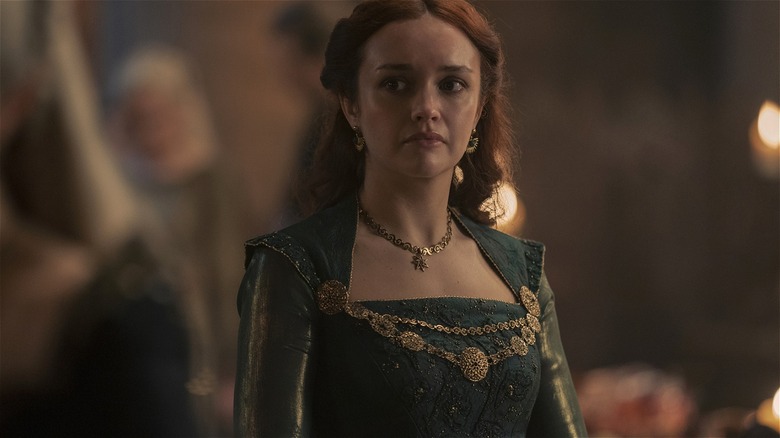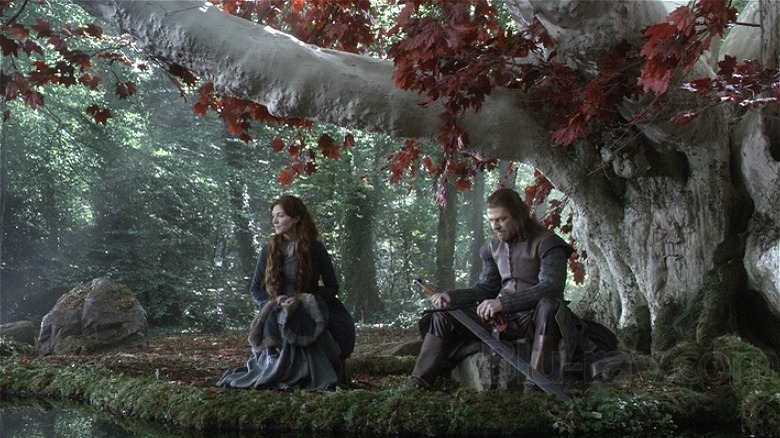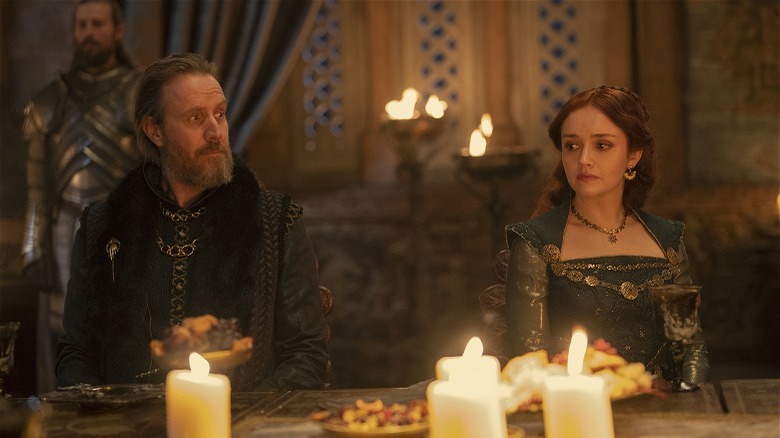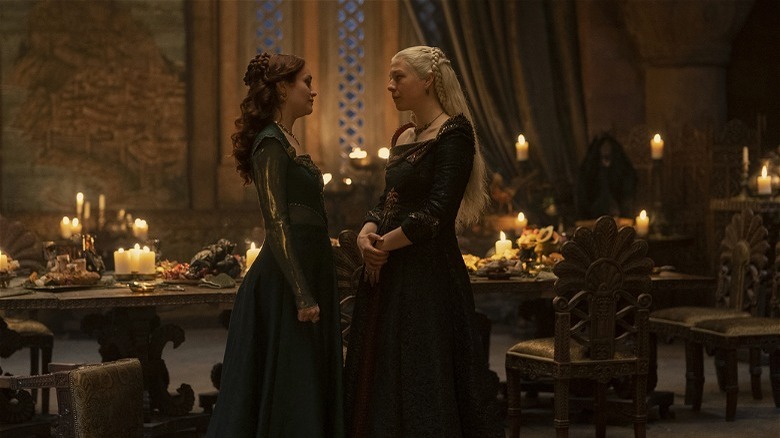House Of The Dragon: The Seven-Pointed Star And Westerosi Religion Explained
This post contains spoilers for episode 8 of "House of the Dragon."
Religion has not been a major theme in the first few episodes of "House of the Dragon," as the show focused more on familial infighting and the chaos that encircled House Targaryen. While chaos still reigns over the titular house, the latest episode, "The Lord of the Tides," brings Westerosi religion into the mix. The Faith of the Seven emerges as a new way of life in Westeros, which is symbolic of a tectonic shift in power that also comes with significant political implications.
After Rhaenyra (Emma D'Arcy) and Daemon (Matt Smith) visit King's Landing after six years, they notice that their home has been unceremoniously stripped of visual elements that are a reminder of House Targaryen's power and prestige. Instead, the halls are adorned with the Seven-Pointed Star, which symbolizes the holy text of the Faith of the Seven. In order to further drive this sense of displacement, we see Queen consort Alicent (Olivia Cooke) adorned in seven-pointed star chains and pendants, which grants her the appearance of religion-backed poise and morality. Of course, this is but a shallow veneer that is painfully hollow.
So, what's up with this budding Westerosi religion that is taking center stage within the nexus of political power? In "Game of Thrones," we were made aware of the schism between belief in the Old Gods and the New, and "House of the Dragon" seems to be setting the stage for this new chapter in Westerosi history. Let us look into it, shall we?
The Old Gods versus the New
The various kingdoms and cultural pockets in the Seven Kingdoms obviously point to the fact that there was no uniform religion followed by the people. Instead, different groups devoted themselves to a multitude of faiths, both widespread and localized. However, in this context, we will be looking exclusively into the Westerosi faith, which, per George R. R. Martin's work, can be broadly divided into three predominant faiths.
First, there is the Old Gods of the Forest, which is similar to nature and spirit worship that dates back eons. Although most folks believe in the Old Gods at this point in history, in "House of the Dragon," this belief will slowly be pushed out by The Faith of the Seven. This new faith will come to find immense popularity in Westeros, with devotees worshipping the seven-faced God. As per the events dictated by "Game of Thrones," it is known that the faith lost much of its influence following the destruction of the Sept of Baelor.
Local faiths in Westeros also include The Drowned God, followed by the folks in the Iron Islands, who value maritime prowess and combat skills above all. As this faith is only confined to one particular region, the major rift exists between the followers of the Old Gods and the New, with various characters using their religion to further their own motivations.
The Seven-pointed star
As explained above, the seven-pointed star is a symbol of the Faith of the Seven, which represents seven aspects of a single deity, which manifests through the followers of the faith (or so it is believed). The holy text is mentioned at several points in "Game of Thrones," where we see that The Sparrows indulge in religious fanaticism, which was used rather shrewdly by Cersei to manipulate events in her favor.
In the context of "House of the Dragon," the seven-pointed star is used by Alicent to replace the Targaryen banners in King's Landing. This serves several purposes: by doing this, Alicent is able to solidify her position (along with that of the Greens) by removing anything that is a reminder of the Targaryen rule, and the seven-pointed star ushers in a new wave of faith in Westeros, usurping an age-old, established religion. Alicent's sudden faith in this new religion comes off as a desperate attempt to present herself as a chaste, dutiful moral figure — some of which was lost when she viciously attacked Rhaenyra in a fit of rage in episode 7.
This calculated move not only establishes the legitimacy of her position as Queen consort (with Viserys extremely ill, Alicent and Otto basically call the shots now), but also pushes the Targaryen legacy, and by extension, Rhaenyra's claim to the throne, to the sidelines. When Rhaenyra and co. visit King's Landing, they feel a sense of alienation, as their home has changed quite a great deal since their last visit. Couple this with the folks at the Red Keep quietly judging Rhaenyra's kids, and the rightful heir to the throne not being welcomed with appropriate fanfare, and you have trouble brewing. The wheels of imminent war are turning, with Alicent wielding the seven-pointed star as the shiniest weapon in her arsenal.
Why the Faith of the Seven will play a crucial role
Per Martin's "A Song of Ice and Fire," the Faith of the Seven had arrived at a truce with King Jaehaerys I, which prompted this faith to mostly crop up sporadically in the background. After all, familial dissent, bad parenting, a string of misunderstandings, and limitless ambitions were the fuel for the Dance of the Dragons, and religion had little to do with this great war. However, Alicent's insistence on the Faith of the Seven in the latest episode is a troubling development, as it could hint at the possibility that she will use her faith as an excuse to justify her ambitions, and sow greater seeds of dissent between the Greens and the Blacks.
Don't get me wrong, having a new faith to believe in is great and all, but using any ideology to justify one's misguided attempts at retribution is a sure-shot road to corruption and fanaticism. Alicent feels that her sons are entitled to the throne and will do anything at this point to make sure her dreams are not thwarted. Now that she has a new faith to brandish, she might use it as a shield to manipulate future events (we already know she believes she's right and expects rewards for being dutiful and "chaste").
Alicent's belief that she is justified in her claims has been reinforced after Viserys (poor, poor man) mistakes Alicent for his daughter and proclaims that Aegon's prophecy is true. Alicent's son is obviously not The Prince That Was Promised, but her zeal to get what she thinks she deserves will trigger the Dance of the Dragons. With a brand new religion in the mix, I wonder how tragic and bloody things will get in Westeros in the near future.



